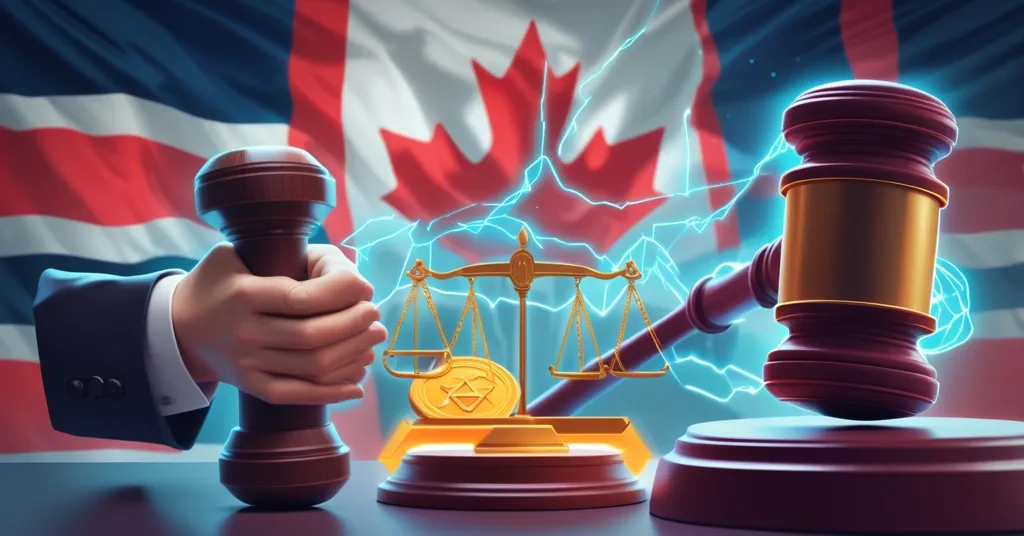TikTok Battles Canada’s Ban: A Tech Freedom Fight with Crypto Implications

TikTok Takes on Canada’s “Outdated” Ban: A Fight for Tech Freedom with Crypto Echoes
TikTok is swinging hard against a Canadian government mandate to shutter its operations over murky national security fears. CEO Shou Chew has called out the ban as a relic of old politics, demanding urgent talks with Industry Minister Melanie Joly to reverse a decision that threatens jobs, culture, and Canada’s global standing—while offering a stark reminder of why centralized tech keeps clashing with state power.
- High Stakes: Over 350 layoffs, slashed investments, and cultural pullbacks loom if the ban is enforced.
- Crypto Connection: Centralized data woes highlight the need for decentralized, user-controlled tech solutions.
Direct Challenge: Shou Chew slams Canada’s ban as outdated, seeking a meeting with Minister Joly to propose data security fixes.
The Ban’s Roots: National Security or Geopolitical Games?
Back in November 2024, Canada dropped the hammer on TikTok Technology Canada, Inc., ordering the dissolution of its local subsidiary under the Investment Canada Act. This wasn’t a public app ban—14 million Canadian users can still scroll away—but a move to dismantle TikTok’s operational presence. The decision, announced by then-Industry Minister François-Philippe Champagne, came after a secretive national security review targeting ByteDance Ltd., TikTok’s China-based parent company. What’s a national security review, you ask? Think of it as a government deep dive to sniff out whether a foreign outfit could be a threat—say, by handing over user data or enabling espionage. The catch? No specific evidence has been shared, just vague nods to “risks.”
These fears likely tie to Chinese laws that could force companies like ByteDance to cough up data for intelligence purposes, a concern echoing across Western nations. It’s the kind of thing that keeps policymakers up at night: a backdoor key to personal info on millions of users, potentially weaponized by a foreign state. But without hard proof, this feels like a shot in the dark, and Chew isn’t buying it. In a July 2, 2025, letter to current Minister Joly, he demanded a face-to-face within two weeks, arguing the order was born from a bygone era when a U.S. ban seemed certain—a domino that hasn’t fallen thanks to repeated delays, including President Donald Trump’s latest extension in June 2025. You can explore more on Chew’s stance in his letter to Joly.
“There is no upside to this outdated and counterproductive government order, which was issued under a different government and in a different era, and which doesn’t reflect today’s reality.” – Shou Chew, TikTok CEO
TikTok’s Counterpunch: Evidence or Bust
Chew isn’t just pleading—he’s fighting. TikTok has floated solutions like enhanced data security protocols, transparency boosts, and external oversight to address any legitimate worries. So far, there’s no sign Joly or her team are biting, leaving TikTok in limbo as the clock ticks. Chew’s warning is blunt: the wind-up process is nearing a “critical juncture,” and compliance or escalation looms. Meanwhile, the company has taken the battle legal, filing a Federal Court challenge in December 2024, claiming the ban lacks any rational link to real security threats. Good luck getting details on those threats, though—governments love hiding behind the “classified” curtain, much like they did with past tech crackdowns on Huawei and Kaspersky. For a deeper look into TikTok’s pushback, check out their latest challenge to the Canadian ban.
“The wind-up process is rapidly approaching a critical juncture.” – Shou Chew
Let’s cut through the fog: is this ban grounded in hard evidence or just geopolitical theater? Canada’s playing the tough guy while its Five Eyes intelligence partners—the U.S., UK, Australia, and New Zealand—just shrug. No other member of this tight-knit coalition has gone for a full operational shutdown, sticking to lesser measures like barring TikTok on government devices. Chew’s point stings: Canada’s solo act risks isolating it from allies and, ironically, reduces accountability. A local team, he argues, keeps TikTok answerable to Canadian rules and oversight.
“TikTok maintaining a presence in Canada means there is a local team who is accountable to Canadian policy-makers and authorities.” – Shou Chew
Economic and Cultural Fallout: A Heavy Price
If enforced, this ban won’t just be a bureaucratic slap—it’ll hurt. TikTok warns of over 350 layoffs in Canada, a complete halt to direct investments, and a gut punch to local creators who rely on the platform’s support. The cultural bleed is already happening: on July 7, 2025, TikTok announced it’s pulling sponsorships from major Canadian events like the Juno Awards and the Toronto International Film Festival (TIFF). For a platform that’s a lifeline for young talent and a cultural force, this retreat isn’t just business—it’s personal. Canada’s creative economy, already reeling from digital shifts, could take a lasting hit, all over fears that remain frustratingly undefined. Learn more about the economic and cultural impact of this decision.
Historically, tech bans have a nasty ripple effect. When Huawei got the boot across Five Eyes nations, telecom markets suffered higher costs and delayed 5G rollouts. Kaspersky’s restrictions reshaped cybersecurity options without a clear “smoking gun” of wrongdoing. TikTok’s case feels different due to its social impact—unlike hardware or software, it’s woven into daily life for millions. Does Canada risk more than it gains by alienating a cultural giant on shaky grounds? That’s the gamble.
Global Context: U.S. Flip-Flops and Canada’s Lone Stance
Canada’s timing raises eyebrows. The national security review kicked off in late 2023, staying under wraps until March 2024, right as the U.S. was pushing hard to ban TikTok or force ByteDance to sell. But the U.S. stance is a mess—Trump, after riding TikTok’s reach during his campaign, has delayed ban deadlines multiple times, with the latest in June 2025. Chew’s argument cuts deep: if the U.S. isn’t pulling the trigger, why is Canada rushing ahead on assumptions that no longer hold? Could this be less about protecting Canadians and more about playing lapdog to outdated U.S.-China tech war rhetoric? It’s a question worth chewing on. For a broader perspective, see how Canada’s approach compares in this comparison of TikTok policies across Five Eyes countries.
Among Five Eyes allies, Canada’s outlier status is glaring. The UK, Australia, and New Zealand have aired concerns but haven’t gone nuclear with operational bans. Even the U.S., for all its bluster, keeps kicking the can down the road. Experts like Emily Taylor from Cyber Policy Journal warn that Canada’s move could spark a global domino effect, much like Huawei’s ban did—though Trump’s waffling might slow that momentum. Former UK cyber chief Ciaran Martin agrees U.S. policy often sways allies, but questions whether Canada’s hardline stance holds if American pressure fades. For now, Canada stands alone, and the silence from Joly’s office as of mid-July 2025 only thickens the plot.
Lessons for Decentralized Tech: A Crypto Wake-Up Call
For those of us rooting for disruption and freedom in tech, TikTok’s plight is a neon sign flashing “centralization kills.” The core issue here isn’t just ByteDance’s ties to China—it’s the very model of centralized platforms. TikTok holds user data in vast, vulnerable silos, making it an easy target for government fears (founded or not) of foreign access. Contrast that with the ethos of Bitcoin and blockchain tech: user-controlled data via cryptographic keys, no single point of failure, no corporate overlord to strong-arm. If TikTok’s data lived on a decentralized network, would Canada even have a case to ban it? Dive into community thoughts on this topic through this Reddit discussion on ByteDance and the ban.
Let’s dream big for a second. Imagine a TikTok built on Ethereum or a privacy-focused chain like Monero—creators mint videos as NFTs, earning directly via smart contracts without a corporate middleman. Users own their data, deciding who sees what through blockchain wallets, not ByteDance servers. Projects like Mastodon, a decentralized social network, already hint at this future, though they lack TikTok’s scale and polish. Sure, scaling decentralized apps to handle TikTok’s 14 million Canadian users is a pipe dream today—blockchain tech struggles with speed and cost at that level—but the principle stands. Centralized systems will always be pawns in geopolitical chess; decentralization flips the board. TikTok’s proposed decentralized tech solutions offer a glimpse of what could be.
This isn’t just theory—it’s a call to action for the crypto space. Bitcoin maximalists might scoff at social media fluff, but the fight for digital sovereignty ties directly to BTC’s mission of financial freedom. Altcoins like Ethereum, with their smart contract muscle, could power the next-gen social tools that sidestep bans entirely. Even if you think TikTok’s a fad, its battle with Canada shows how state overreach threatens any tech—crypto included. If governments can shutter a cultural titan on vague grounds, what stops them from targeting decentralized projects next? The fight for digital liberty just got real.
Playing Devil’s Advocate: Is TikTok Really Innocent?
Let’s not paint TikTok as a blameless victim. While public evidence is MIA, ByteDance’s ties to China aren’t pure conspiracy—Chinese laws mandating data cooperation with the state are real, and documented surveillance isn’t fiction. Canada’s fears, however flimsy, aren’t baseless; they’re just unproven. But here’s the rub: banning without proof sets a dangerous precedent. Today it’s TikTok, tomorrow it could be a blockchain startup flagged as “risky” for operating outside government control. The lack of transparency isn’t just infuriating—it’s a slippery slope for innovation. Governments hiding behind “national security” without a shred of public accountability is a power grab, plain and simple, and we shouldn’t stand for it, whether the target is a centralized app or a decentralized protocol. For more context on these concerns, take a look at this overview of TikTok’s security issues in Canada.
Key Questions and Takeaways for the Crypto Crowd
- What national security risks does Canada claim TikTok poses?
The specifics are under wraps, but fears likely center on ByteDance’s potential obligation under Chinese law to share user data for intelligence, risking privacy and security for 14 million Canadian users. - Why is Canada an outlier among Five Eyes allies?
Unlike the U.S., UK, Australia, and New Zealand, Canada’s pushing a full operational shutdown rather than limited restrictions, isolating itself despite shared intelligence ties. - What’s the economic and cultural cost of this ban?
Enforcement threatens over 350 layoffs, halts TikTok’s investments, and cuts support for creators and events like the Juno Awards, hitting Canada’s creative sectors hard. - How does TikTok propose to fix security concerns?
Chew W offers beefed-up data security, transparency measures, and external oversight, though Canadian officials haven’t engaged with these ideas yet. - Why should crypto enthusiasts care about this fight?
TikTok’s centralized data model fuels government overreach—a problem blockchain tech solves with user sovereignty. This ban warns of future threats to decentralized projects if state power goes unchecked. - Could decentralized tech prevent such bans?
Potentially, yes—blockchain-based social platforms could give users data control via cryptographic keys, stripping governments of easy targets like centralized servers to attack or ban.
As TikTok’s showdown with Canada unfolds, the stakes extend far beyond one app. This is about how nations wield “security” to control tech, often at the expense of innovation and freedom. For those of us in the crypto space, it’s a loud reminder: centralized systems are fragile, ripe for state meddling, while decentralized solutions offer a defiant alternative. Canada’s next move—dialogue, enforcement, or retreat—could set a precedent for how tech battles play out globally. And if you think Bitcoin or Ethereum are immune to this kind of scrutiny, think again. The fight for a freer digital world is on, and TikTok’s just the opening act. For additional opinions on this issue, explore this Quora thread on Canada’s security concerns.


